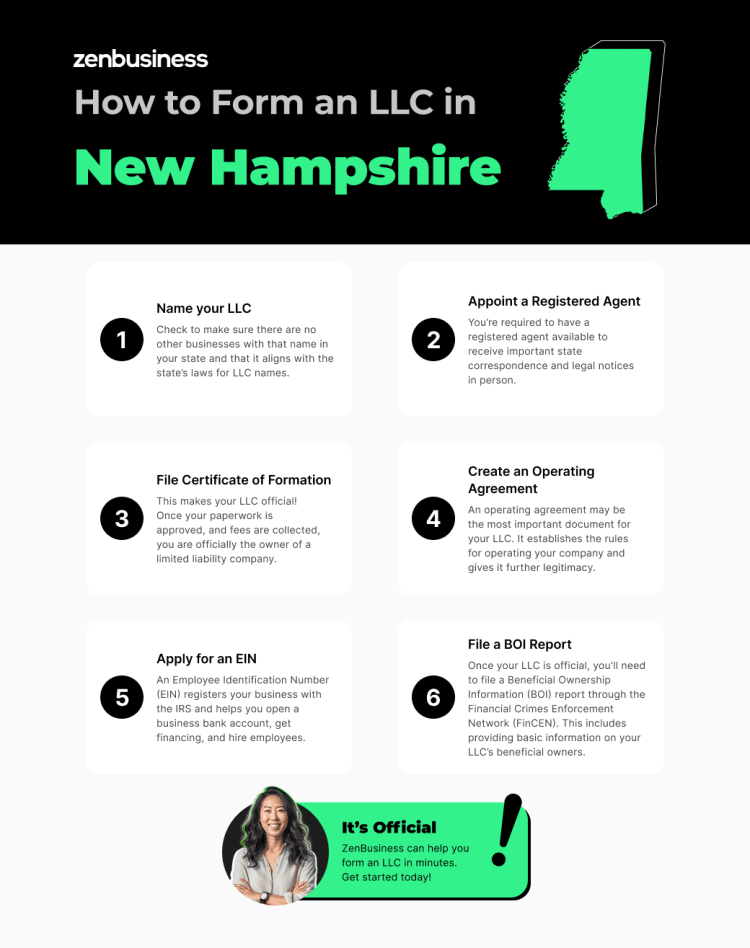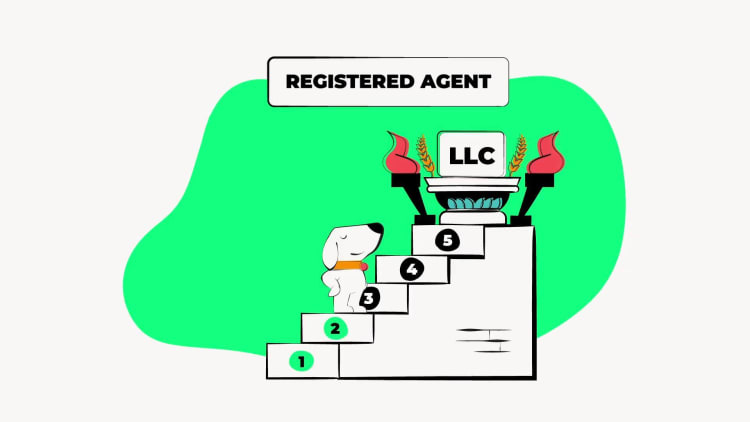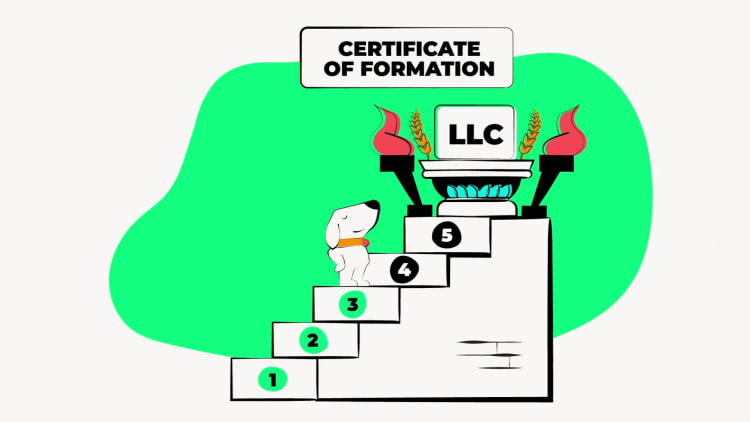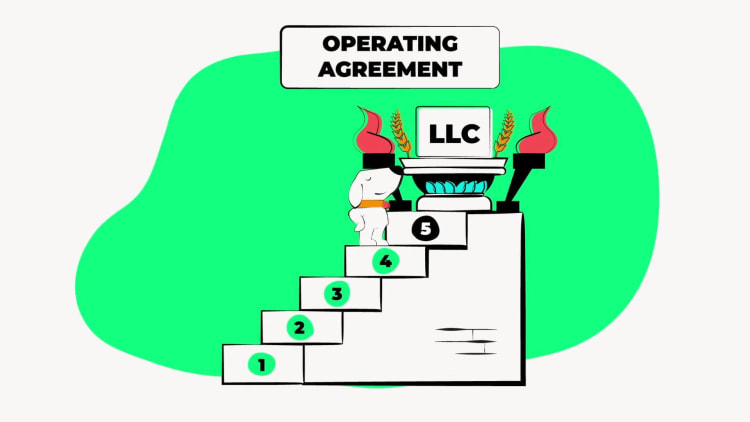*Mr. Cuban may receive financial compensation for his support.
Last Updated: June 12, 2024
So you’re looking to start a New Hampshire LLC? Ah, the Granite State — where the hills are alive with the sounds of small business potential and not just bike rallies in Laconia or skiing at the White Mountains. While the state may be a playground for outdoor enthusiasts, New Hampshire also happens to be a pretty solid place to lay the cornerstone for your enterprise.
Sure, CNBC gave the state a gold star for business friendliness, but let’s be real: navigating the maze of limited liability company (LLC) requirements here isn’t the same as a breezy day on Lake Winnipesaukee. This guide is like your roadmap, sans potholes, leading you through the New Hampshire-specific legal maze you’ll need to get through.
How to Start Start an LLC in New Hampshire
An LLC is a popular entity choice because it offers personal asset protection; as long as you operate properly, your personal belongings are usually safe if something goes wrong with the business. There’s also a lot of flexibility and easy management that comes with an LLC compared to a corporation.
Before we begin, we should note that this guide is all about setting up a domestic New Hampshire LLC. If you’re looking at a foreign LLC or professional limited liability company (PLLC) ventures, you’ll need a different roadmap.
- Name your New Hampshire LLC
- Appoint a registered agent in New Hampshire
- File New Hampshire Certificate of Formation
- Create an operating agreement
- Apply for an EIN
- File your LLC’s BOI report

1. Name your New Hampshire LLC

Pick a name. Before you can form your LLC in New Hampshire, you must choose a name. The business name is one of the most significant pieces of establishing your new LLC. The right name will broadcast your business purpose and culture to your customers. That said, while you can be creative with your name, it must meet specific requirements before you can register it.
Official Naming Requirements in New Hampshire
The New Hampshire Revised Limited Liability Company Act includes particular legal requirements for naming your New Hampshire LLC. Every LLC in New Hampshire must include one of the following identifying suffixes in its name: Limited Liability Company, LLC, L.L.C., or L. L. C.
Also, the name must be unique and available. Your name must be distinguishable from all other business and trade names registered in New Hampshire to be unique.
A name isn’t unique if the only difference is:
- An article
- The plural of the same word
- The same name or word is spelled differently
- An abbreviation instead of the full spelling of the name
- A suffix or prefix added to a word, a variation or derivative of the same word, excluding antonyms and opposites
- A change in the identifying suffix
- Unless the current name holder consents, the addition of a numeric designation
- Differences in punctuation or special characters, unless they change the word’s clear meaning
- Differences in whether letters or numbers follow each other immediately or are separated by spaces
- An Arabic or Roman numeral representing a number or a word representing the same number in the same position within otherwise identical names
As you can see, your name must be truly unique. “Let’s Go Racing” and “L3ts G0 R4cing” don’t pass New Hampshire’s distinguishable test.
In addition, your LLC name can’t imply that it’s organized for an illegal purpose. Words associated with certain licensed professions (doctors, engineers, etc.) and certain institutions (banks, colleges, etc.) will need special permission to be used in your name.
Once you have some ideas, you can complete a business name check with the Department of State website to see if your chosen name is available. If you’re not sure how to do this, use our business entity name search tool to guide you through the steps.
Reserving a Name
When you find a unique name for your New Hampshire LLC, you can reserve it if you want. Reserving a name doesn’t form your LLC, but it grants you exclusive rights to use the name for 120 days.
This isn’t required, but it protects your name while you collect the information you need for your formation documents. The Application for Reservation of Name has a small filing fee. If you need additional preparation time, you can re-file and extend the reservation for another 120 days.
Searching for a Domain Name
Most entrepreneurs know they need a website and email address to promote their business online. When choosing a domain name, consider securing a URL that reflects your business name. The availability of a domain name that’s easy and accessible for your customers might influence your decision. When you find the right one, use our domain name registration service to secure it right away.
Is your New Hampshire LLC name available as a web domain?
An online presence is vital for every new business. When choosing your business name, consider how you want to represent your LLC online. An effective web domain name is one your customers can easily remember, recognize, and access. Perform a search and see if your business name is available. You might also want to search to see if your name is available on social media. Businesses often reach customers through Facebook, TikTok, or Instagram. If the name you want isn’t available as a domain name, it might influence the name you choose for your company.
Check for trademarks
Even if the Secretary of State approves your business name, it’s still possible that someone else has already claimed it with a federal or state trademark. To truly check to see if your business name isn’t trademarked is difficult because there’s no one central place to check.
You can take some measures yourself, like searching the trademark database on the United States Patent and Trademark Office website. This can help you determine if someone’s already claimed a federal trademark on the name you want.
State trademarks are applicable only within the borders of a state. To find out if your desired name has been trademarked at the state level, contact the New Hampshire Secretary of State. If you want, you can also apply for your own state trademark by filing a Trademark Application with the New Hampshire Secretary of State. Registration is effective for 10 years. You’ll pay a filing fee for each application you submit.
It’s also wise to do extensive internet searches for your business name, including checking domain names, social media sites, and online phone directories.
Registering a DBA
If you plan to do business with a name other than the LLC’s legal registered name, you must register a trade name with the New Hampshire Secretary of State. Your trade name, also called a “DBA” or “doing business as” name, should be unique and distinguishable from other registered business names. However, it doesn’t need to include an identifying suffix. Trade name registration is effective for five years, and there’s a filing fee.
Ready to Start Your New Hampshire LLC?
Enter your desired business name to get started
2. Appoint a registered agent in New Hampshire

Designate a registered agent. Before completing your LLC formation, you need to appoint a NH registered agent. A registered agent is a person designated to receive legal notices (such as service of process) and certain state correspondence for the company. When they receive a notice or correspondence, they’ll forward it to you.
Who can be a registered agent for an LLC in New Hampshire?
You can appoint a New Hampshire resident or a corporation, LLC, or limited liability partnership with a registered office in New Hampshire as your registered agent. The registered agent address must be a physical street address and not a P.O. box or something similar. Your registered agent must be available at their business address during regular business hours to receive notices.
If you name yourself or a friend, you could miss important notices if you take a day off, visit clients, or go on vacation. You also risk being served with notice of a lawsuit in front of customers or business partners.
What if the state can’t find my New Hampshire registered agent?
Your registered agent is the contact person for service of process, subpoenas, and certain government notices. If the state can’t find your registered agent, it’ll send the notice by registered or certified mail to the LLC’s principal office. The state may also serve a manager by certified mail or any other method. It’s easy to dismiss or misplace a notice received by mail, so it’s a good idea to keep your registered agent up to date or use a commercial registered agent service.
Using a Registered Agent Service
Some corporations and LLCs exist to serve as commercial registered agents for other businesses. Using a commercial registered agent service allows you to avoid the unfortunate scenarios above. What’s more, you won’t have to change your registered agent address if you move to a new business location.
To simplify things, use our registered agent service, and we’ll connect you with a New Hampshire registered agent.
3. File New Hampshire Certificate of Formation

Complete and submit the LLC paperwork. To form your New Hampshire LLC, file your Certificate of Formation with the New Hampshire Secretary of State, Corporations Division. We’ll guide you through this step and complete the filing for you when you use our business formation services. And to get you up and running faster, we can provide expedited service to put you at the front of the line.
If you choose to complete the process on your own, follow these instructions for starting an LLC in NH.
Create an NH QuickStart account to file your Certificate of Formation
To file your New Hampshire Certificate of Organization online, you’ll need to create a QuickStart account on the New Hampshire Secretary of State’s website and pay a $102 fee. The filing fee for your Certificate of Formation isn’t the only fee you may need to pay. We’ve listed all the fees for NH LLC registration on our LLC costs page.
Information Needed for NH Certificate of Formation
When you file your Certificate of Formation online, the Secretary of State will ask you to provide:
- The LLC name and business address
- The appointed registered agent’s name and address
- A statement of the company’s purpose or primary business
- Whether the LLC will be managed by the members or a manager
- A list of members and/or managers
- Any other information you want to be public
You can complete the Certificate yourself, or an organizer may file it on your behalf.
Member-Managed or Manager-Managed?
A significant benefit of the LLC is the ability to choose how you want it to be managed. It’s important to make this decision ahead of time so you can list it on your Certificate of Formation.
If your LLC has a few members who want to be involved in decision-making, the member-managed LLC is likely best for you. In a member-managed LLC, the members share responsibility for making business decisions on behalf of the company.
However, if you have passive investors as members, you might want to appoint a manager. In a manager-managed LLC, the manager can be authorized to run the company, make decisions, and sign deals.
What if I need to make changes?
If you make changes to your NH LLC registration, you’ll need to file a Certificate of Amendment and pay a filing fee. Filing an amendment alerts the Secretary of State to the change. We can handle this for you with our amendment filing service. Also, consider our Worry-Free Compliance service, which helps keep you in compliance and includes two amendments a year.
Why would I delay my New Hampshire LLC filing date?
Usually, your Certificate of Formation is effective on the day you file it. This is true even if it takes time for the Corporate Division to process your document.
However, if you aren’t quite ready to open your doors, you can delay the effective date of your formation for up to 90 days. If you’re opening toward the latter part of the year, waiting to file until January 1 can keep you from owing taxes or needing to file an annual report if you haven’t started transacting business.
4. Create an operating agreement

Draft an LLC operating agreement. Next, create your operating agreement to set rules to control the management of your LLC.
New Hampshire doesn’t require that you file an operating agreement. However, your LLC’s operating agreement is an essential document that governs the business’s internal operations — and it’s always best to have one.
When you draft your own operating agreement, you control how distributions are made, when members can leave or join the company, and what happens if a member dies. If you don’t have an operating agreement, you must follow the default rules in New Hampshire’s law to resolve disputes. Unfortunately, these default rules may not give you the result you want.
What to Include in Your Operating Agreement
Every LLC’s operating agreement will look a little bit different; after all, it’s customized to your business’s unique needs. That said, there are some common areas most agreements will include. Here are some core tenets to include in yours:
- How profits will be distributed
- Member responsibilities
- How to add or remove members
- How the LLC will be managed
- How to dissolve the business
- Decision making and conflict resolution
If you’re unsure as to how to write an operating agreement for your LLC, we offer a customizable operating agreement template to get you started.
Do I need an operating agreement even if I’m the only owner?
While operating agreements generally control disputes between owners, they can also be a helpful document for single-member LLCs. The operating agreement usually provides the procedure for continuing or terminating the business if a member dies or becomes incapacitated. Further, some banks, potential investors, and future business partners will want to see that you have an operating agreement.
In addition, an operating agreement can help protect your personal assets. Sometimes, an interested party can sue the LLC’s members if they have co-mingled their personal and business assets. In that case, your operating agreement can act as additional evidence that the LLC remains separate from its owners.
5. Apply for an EIN

Get an Employer Identification Number (EIN). The final step to NH LLC registration is applying for an EIN from the Internal Revenue Service (IRS). In most cases, your LLC needs an EIN to file tax returns, report wage withholdings, and apply for a business bank account. You can apply through the IRS website or use our EIN Service, and we’ll handle it for you.
Register for New Hampshire taxes
By starting an LLC in NH, your business will owe income taxes to the New Hampshire Department of Revenue Administration. You can register for state taxes online through Granite Tax Connect.
Be prepared to file a tax return every year, usually in March, for the Business Enterprise Tax and Business Profits Tax; these taxes apply only to businesses with a certain income threshold, which varies from year to year.
Also, expect to register with the state and federal governments if you’re in a regulated industry, like food service, timber, or tobacco.
For Employers
When your business employs one or more workers, New Hampshire Employment Security requires that you file an Employer Status Report. You must also report all new hires and submit a Quarterly Tax and Wage Report for every quarter you have employees.
Additionally, all New Hampshire employers must have workers’ compensation insurance. Workers’ compensation insurance pays medical and wage benefits if an employee is injured on the job.
Step 6: Submit your LLC’s beneficial ownership information report
Beginning in 2024, LLCs and other small businesses have a new requirement to uphold: filing a beneficial ownership information report, or BOI report. This requirement was introduced by the Corporate Transparency Act. This legislation aims to help protect against financial crimes like money laundering by making it more difficult for organizations to use shell companies to hide illicit activity.
To make that happen, the act requires LLCs to disclose information about their beneficial owners. In your LLC, a beneficial owner is anyone who owns 25% or more of your ownership interest, exercises substantial control, or gets a significant economic benefit from it. For each beneficial owner, you’ll need to provide a name, address, and identifying documents.
You’ll provide this information to the Financial Crimes Enforcement Network (FinCEN) by filing your BOI report. You can file directly online with FinCEN’s website or upload a PDF version of the form. Either way, it’s free, and it’s essential to file on time. This filing is due within 90 days of getting New Hampshire’s approval for your Certificate of Formation if you get started during 2024. LLCs that organize in 2025 onward will have just 30 days post-approval to file. Any LLCs that already existed before 2024 will need to file by January 1, 2025.
If you’d like to learn more about the BOI report, check out FinCEN’s website for more information. Our BOI filing report service can also make this step hassle-free for you.
Next Steps After Forming Your LLC in New Hampshire
After you start your LLC, your work isn’t quite finished. There are some follow-up steps to complete to help ensure that your LLC is compliant with state laws and operates as smoothly as possible.
Getting Business Licenses and Permits
Forming an LLC in New Hampshire doesn’t require obtaining a general business license or collecting sales taxes. However, if you operate in a regulated industry, you may need a license from the state or federal government. In New Hampshire, regulated businesses must register using Granite Tax Connect. Regulated businesses include food service, hotels, restaurants, tobacco, timber, and alcohol.
Apart from those, you still need to make sure your LLC has all the other licenses and permits it’s required to have by law. Unfortunately, because licensing varies by industry and location and can occur on the federal, state, and local levels, there’s no central place to check to see if you have all the licenses and permits you need. You’ll need to do some research.
For example, even though New Hampshire doesn’t have a “general business license” at the state level, there’s a chance your city or county might. For example, businesses in Manchester need to get a general business license at the city level. And lots of cities have extra requirements for industry-specific licenses. It’s your job to cover all these bases (and to do so for every city and county you operate in).
If you don’t feel like doing all this research, or if you just want the peace of mind of knowing that your business has every license and permit it’s legally required to have, our business license report service can do the work for you.
Setting Up an Accounting System
Setting up a robust accounting system is crucial. A good system should manage invoicing, track expenses and income, and prepare financial statements for tax purposes.
There are lots of different tools you can use: a spreadsheet, accounting software, hiring a professional, or even using our Money tool. The most important thing is that you pick a system and stick with it.
Opening a Business Bank Account
Open a separate bank account for your LLC. This is vital for keeping your business finances distinct from personal funds. If you can, choose a bank offering services beneficial to small businesses, like low fees or online banking.
When you apply for your bank account, you’ll probably be asked to provide documentation, such as your EIN, your Certificate of Formation, your operating agreement, and so on. Your financial institution will let you know exactly what documentation you should provide.
Staying Informed About Legal Requirements
Stay informed about legal changes impacting your LLC. This includes understanding tax requirements, both state and federal, and any changes in business regulations. Regularly check updates from the New Hampshire Secretary of State and consider consulting with a legal advisor.
Legal Requirements for a NH LLC
For an NH LLC, maintaining compliance with state laws is crucial. This includes filing annual reports with the Secretary of State and adhering to tax obligations. The annual report updates the state on your business’s current information and is essential for staying in good standing. Tax obligations vary based on your LLC’s activities and revenue.
It’s also important to comply with any industry-specific regulations, which may involve additional reporting or operational standards. If you have employees, you must follow state employment laws related to wages, safety, and workers’ compensation.
New Hampshire Formation Fees
When you start up a business, there are a variety of costs to budget for. Every LLC will have slightly different costs, but here are the most common ones you can expect:
- Certificate of Formation: $102.
- Registered Agent Service Fee: Varies, but usually between $100 to $300 annually
- Annual Report Filing Fee: $100, plus a $50 late fee if not filed on time
Granted, these costs vary significantly depending on your unique business. For example, many businesses will have extra annual fees associated with the licenses or permits they need.
Alternatives to an LLC in New Hampshire
If you’ve read this far into this guide and you’re still wondering if an LLC is right for you, don’t worry. You do have alternatives. Here are some of the different business structures you might try instead.
- Sole proprietorship: A sole proprietorship is an unincorporated business entity owned and operated by a single owner. It does not have personal asset protections, but it’s very easy to start and run.
- Partnership: A partnership is very similar to a sole proprietorship, but it’s owned by two or more individuals.
- Corporation: A corporation is a registered business entity owned by shareholders and led by a board of directors. The owners have personal asset protections. The business has quite a few compliance requirements, including annual reports, shareholder meetings, meetings for the board of directors, and more.
If you’re not sure which business entity type is right for you, we highly recommend chatting with a business attorney. They’ll give you personalized guidance so you can pick the business structure that’s most advantageous for you.
Need help filing your NH LLC?
At ZenBusiness, we believe every aspiring entrepreneur should have the tools and support necessary to create a business, which is why we’ve made it easy with our free LLC service. When it comes to New Hampshire LLC creation, you’ll probably have questions throughout the process. When you use our products and services, our team of business experts will be here to guide you on how to start an LLC in New Hampshire.
Likewise, we’ll help keep your business legally compliant and up to date with the required filings throughout every stage. From the White Mountains to Merrimack Valley, Portsmouth, and the Great Bay, we offer specially tailored services to New Hampshire entrepreneurs.
Related Topics
NH LLC FORMATION THAT’S FAST AND SIMPLE
Take it from real customers
New Hampshire LLC FAQs
-
The fee for filing the NH Certificate of Formation online is $102, but this isn’t the only fee you might encounter.
-
Starting an LLC provides business owners with personal liability protection and flexibility. Because the business is its own legal identity, the owners’ personal assets are separate from the business and not usually available to satisfy business debts and liabilities. Further, the LLC allows the owners to customize their experience with operations, distributions, and taxes.
-
Federal Taxes
LLCs are typically considered “pass-through entities,” meaning that the business itself typically doesn’t pay federal income tax on its profits. The responsibility to pay income taxes falls only on the individual. This differs from most corporations, where profits are taxed at both the business level and the individual owners’ level.
Single-member LLCs don’t have to file a separate federal return for their LLC. They report the LLC income on their personal income tax return (Form 1040). But LLCs with multiple members must file a separate information federal return for the LLC, Form 1065. Then each LLC member reports their share of the profits on Schedule K-1 and attaches it to their own personal federal tax return.
Although LLCs are taxed as sole proprietorships or general partnerships by default, LLCs also have the option to be taxed as corporations. Some LLC members choose to classify their businesses as an S corporation or a C corporation, which can be advantageous for certain LLCs.
In particular, many LLCs elect to be taxed as S corporations because it can potentially save the members money on self-employment taxes. You can learn more on our “What Is an S Corp?” page.
You also have a few other forms of federal taxation to keep in mind. For example, you’ll likely need to pay self-employment taxes on your share of the LLC’s profits. These are the taxes that go toward Social Security and Medicare. Fortunately, LLC members can deduct half of the self-employment taxes paid as a business expense.
State Taxes
If it meets the income threshold, a New Hampshire limited liability company will need to pay the Business Enterprise Tax and Business Profits Tax to the New Hampshire Department of Revenue Administration. For more information on what your LLC’s tax responsibilities will be, contact the New Hampshire Department of Revenue Administration and your local tax authorities.
-
When you submit your Certificate of Formation, the New Hampshire Secretary of State, Corporate Division will review the documents for compliance. If filing online, the review usually takes approximately five to seven business days. Filing by mail can take weeks.
-
No, the operating agreement is an internal document governing business operations and control.
-
By default, LLC owners only pay state and federal taxes on their personal income from the LLC. The LLC isn’t separately taxed.
Some LLCs (particularly those with high earnings) may choose to file taxes as either an S corporation or a C corporation. This option can have some advantages for certain LLCs. You can learn more about how these methods of taxation compare on our LLC vs. S corporation and LLC vs. C corporation pages.
In evaluating these options, it’s helpful to get advice from a qualified tax professional.
-
No, New Hampshire doesn’t authorize Series LLCs.
-
When you need to close your business, you’ll follow the procedures in your operating agreement for dissolution and winding up. Usually, dissolution requires a member vote. You’ll need a Certificate of Dissolution from the Department of Revenue Administration showing that your LLC doesn’t owe any taxes. You’ll also need to let your creditors know of your closing by sending them a letter and publishing a notice in a local newspaper. Once you’ve paid your creditors and distributed any remaining assets to the members, you’ll file a Certificate of Cancellation with the Secretary of State to terminate your registration.
For more information, see our New Hampshire dissolution page.
-
A well-written operating agreement will detail the process for transferring your LLC ownership. Selling your interest usually requires the consent of the remaining members and a purchase agreement. You’ll also need to file an amendment to your Certificate of Formation to update the ownership.
For more information, see our New Hampshire LLC ownership transfer page.
-
Yes. Any business that operates under a name different from its registered name must file a DBA or trade name with the state.
-
Look to the provisions of your operating agreement for the process. You may have to take a vote or prove cause before removing a member. Your operating agreement likely also outlines the process for distributing the departing member’s interests to the remaining members. Don’t forget to update your Certificate of Formation with an amendment and ensure your operating agreement reflects the change in ownership.
-
Yes, New Hampshire LLCs must file an annual report updating the state on its information between January 1 and April 1 of each year.
-
While it’s not a legal requirement, it’s a good idea for a new LLC to have a business plan. Drafting a business plan can help you prepare for unexpected events and articulate your goals. Plus, investors and business partners will usually want to see your business plan.
Disclaimer: The content on this page is for information purposes only and does not constitute legal, tax, or accounting advice. If you have specific questions about any of these topics, seek the counsel of a licensed professional.
ZenBusiness is a financial technology company and is not a bank. Banking services provided by Thread Bank, Member FDIC. The ZenBusiness Visa Debit Card is issued by Thread Bank pursuant to a license from Visa U.S.A. Inc. and may be used anywhere Visa debit cards are accepted. FDIC insurance is available for funds on deposit through Thread Bank, Member FDIC.
*Your deposits qualify for up to a maximum of $3,000,000 in FDIC insurance coverage when placed at program banks in the Thread Bank deposit sweep program. Your deposits at each program bank become eligible for FDIC insurance up to $250,000, inclusive of any other deposits you may already hold at the bank in the same ownership capacity. You can access the terms and conditions of the sweep program at https://go.thread.bank/sweepdisclosure and a list of program banks at https://go.thread.bank/programbanks. Please contact customerservice@thread.bank with questions regarding the sweep program.
LLC Formation States Near New Hampshire
Ready to Start Your LLC?




